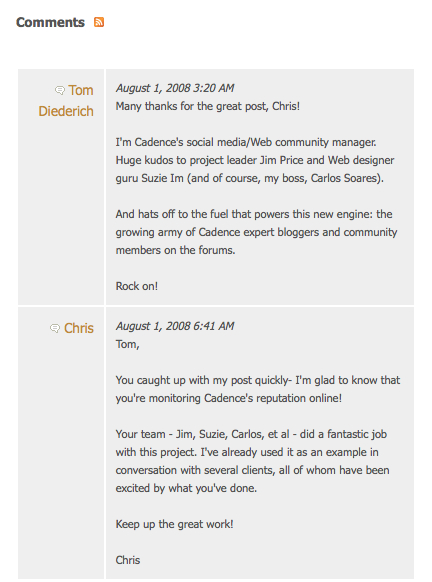When I was a college resident adviser, my boss would frequently challenge me with the same irksome rhetorical question– likely because he knew it vexed me, but also because it was an effective way to get me to really think about how I did my job. He’d tilt his head ever so slightly, raise one eyebrow, and say, “Chris, is perception reality?” I always wanted to answer “no,” valuing the absolute truth over what might be someone else’s incorrect perception of me. Yet I also sensed that the answer was “yes,” because someone’s perception could often be their only real experience of me.
So is perception reality? For many companies, the answer is certainly yes. Customers and potential customers will define a company’s reputation through their collective influence. Whether by word of mouth, written reviews, news stories, or public complaints, the customer’s perception is what shapes the reality of a company’s reputation.
This month, I’d like to review what it means for a company to manage its online reputation, why it’s so important, and some options for how to do it.
Reputation management is simply the practice of being aware of how you, your company, your products or services, or your industry are being discussed online. This can involve monitoring blogs, social networks, forums, reviews, and news sites for mentions of your company or any other keywords that are important to who you are or what you do.
The information you collect should help you answer questions in three areas:
- Awareness. Do people know about your company?
- Attitude. What are people saying about your company? Does it represent a positive or negative attitude toward you?
- Agility (ok, a bit of a stretch, but I needed an “A” word). How effective are you in increasing awareness and improving attitude over time?
%leftsidebar%
#macro:bloglist,3066,agencies#
The concept of online reputation management has even created a new industry of consultants and applications that could help your company. Though the services that reputation management companies offer could be done in-house, many are offering a level of detail and analysis that most agencies would be unlikely to provide to themselves or their clients.
These companies include Umbria, a division of J.D. Power and Associates, which provides in-depth data collection and analysis of social media, and Nielsen Buzzmetrics, which offers a dashboard application for clients to interact with their data. Both Umbria and Buzzmetrics (also) offer trend analysis consultation in addition to reputation management, an attractive and valuable service for business-to-consumer product brands. Either company would be a robust and dependable solution, but neither is going to be cheap. In fact, both specifically target Fortune 1000 companies, so if that is not you or your client, there are a couple of other options available.
One of the most interesting tools I’ve noticed is Trackur, a web-based application that allows you to set up and save keyword searches and retrieve results from web content including blogs, news stories, video, and images. Using its clean and intuitive ajax interface, you can refine your search with additive or negative keyword filtering as well as format sorting, and even add individual results to your favorites or share them with others via email. The key feature of Trackur is that once you have set up your searches, you can save them and have them automatically updated on a schedule determined by your subscription level (Trackur offers an enterprise plan that would suit agencies needing to monitor data on behalf of all their clients) and provided via RSS or email alerts. Trackur offers a 14-day free trial, which I’d certainly recommend to anyone getting started with reputation management.
Trackur CEO Andy Beal is an expert in online reputation management, so as you’re getting more familiar with this concept, it wouldn’t hurt to subscribe to his blogs at marketingpilgrim.com and andybeal.com.
%leftsidebar%
#macro:bloglist,3066,agencies#
I mentioned above that, in addition to the two more costly approaches to online reputation management services, there were two other options available. One is Trackur, which, though it does cost a monthly fee, is a much more affordable and scaled-back service than Umbria or Buzzmetrics. The other option, of course, is to take a do-it-yourself approach. To date, this is the approach we’ve taken at Newfangled.
The simple way to start doing this is to set up RSS feeds of search queries in Google Blog Search, Google News, and Yahoo! News, or even mentions in Twitter (go to search.twitter.com). This will alert you to any time the keyword or keywords in your query are used in blog posts or news stories. If someone mentions your company in a blog post, whether in a negative or positive way, you’ll know about it quickly and be able to respond in whatever way is appropriate to the context. Your keywords should be individuals’ names, your company name, product names, services names, industry-specific jargon, and competitors’ names.

Back in July, I wrote a blog post reviewing the new Cadence Systems website as a companion to our newsletter on Developing an Effective Content Strategy. Within hours, Tom Diederich, then Cadence’s Social Media/Web Community Manager (he’s now the Manager of Community Management Services at Lithium Technologies), responded with a comment. He was able to do this so quickly because he had been monitoring Cadence’s online reputation closely and got an alert when my blog post was published (see our comments to the left).
Earlier this month, I noticed a mention of Newfangled by Worthwhile.com among my Google Blog Search RSS feed (see image below) that I’ve set up for “newfangled.” Worthwhile had written a blog post titled We’ve Got a Blog. Now What? and linked over to our September newsletter on blogging as a resource. I was able to post a comment thanking them as a result.

This approach may not be suitable for a larger, product-oriented company as it requires familiarity with and use of many different social media tools as part of one’s day-to-day work; a consolidated tool like Trackur might be preferable. However, for a smaller, service-oriented firm like ours, the DIY approach has worked out just fine.
%leftsidebar%
#macro:bloglist,3066,agencies#
Of course, managing your online reputation is not only about listening to what others are saying about you. It’s also about making an effort to connect to customers and potential customers in order to establish and maintain a positive reputation.
For many companies, blogging has been an essential aspect of that strategy, as it can be a way for a company to establish a public voice, proactively answer questions, keep people informed of internal developments, and contribute to their authority by adding more content to their website that deals with their area of expertise. Our September newsletter, Is it Time to Start a Blog?, covers this subject in depth.
Companies that offer software solutions should also consider setting up a support forum. The last thing a software company should want is for the majority of conversations about their product to occur offsite. If this is happening, it’s likely that the overall effect will be negative. However, having a support forum allows you to offer online application support as well as provide a venue for existing customers to support one another in a moderated environment. Something like this would go a long way toward building equity with customers and potential customers, much more so than an F.A.Q. We offer a powerful but easy-to-use forum component that can be easily integrated with the NewfangledCMS.
%leftsidebar%
#macro:bloglist,3066,agencies#
If you’re just getting started with reputation management, I’d recommend experimenting with setting up your own RSS feeds. It won’t be the easiest (or simplest) thing to do. In fact, it will probably be a process of trial and error before you find the most direct ways to get the alerts you need. Just keep in mind that your efforts in monitoring your reputation should be commensurate with the effort you put in to your actual service or product. Both will shape the success of your company over time.
Our recent newsletters have tended to focus on issues that just didn’t exist until recently. For many, these concepts probably represent a frustrating non-stop blitz of new things to deal with. Consequently, the takeaway tends to be that there is more internal work to be absorbed into your already packed schedules. I sympathize, of course, but the hard truth is that dedicating resources toward things like web strategy and online reputation management is no longer negotiable. This may start out as extra work for you or someone on your team, but, just like I recommended with content strategy, it needs to eventually be part of someone’s job description.
I always like to offer a little positive spin when offering tough advice, though, so here it is: There are more helpful data and analysis tools available to you now than there have ever been. All you have to do is get up to speed on a few of them before you can put this data to good use. With your brand’s reputation at stake, you really can’t afford not to! So take a deep breath, and just jump in.


